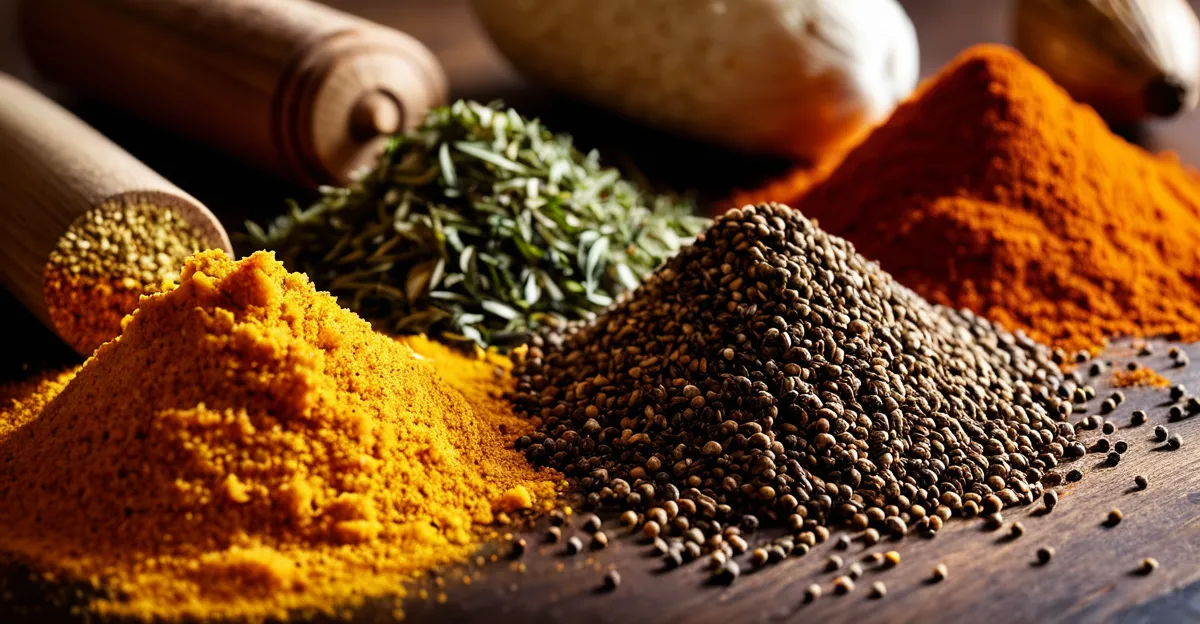Essential Spices in Traditional British Cooking
Traditional British spices form the backbone of many beloved recipes, with black pepper, mustard, nutmeg, and cinnamon taking center stage. These staple spices in the UK add depth and warmth without overpowering, preserving the character of the dishes.
Black pepper is ubiquitous, valued for its sharp, pungent quality. Typically ground fresh, it enhances everything from roasted meats to soups. Its versatility makes it a cornerstone in British spice use.
Topic to read : What are the key ingredients for an authentic Scottish haggis?
Mustard seeds and mustard powder bring a distinct, tangy heat. They appear not only in sauces but also in classic dishes like Cornish pasties or as part of pickling blends, emphasizing British culinary tradition.
Nutmeg, with its sweet and nutty aroma, often features in creamy dishes such as mashed potatoes or custards. It lingers subtly, enriching flavors without overwhelming them.
In the same genre : What tips can help you master a classic Lancashire hotpot?
Cinnamon mainly graces sweet treats, from classic spiced buns to puddings. Its presence evokes warmth and nostalgia, crucial in traditional festive recipes.
Together, these common British spices create a balance of flavour that defines traditional British cooking—rooted in simplicity yet rich in culinary history.
Historical Influence on British Spice Usage
Tracing the journey from trade routes to the British kitchen
The history of British spices is deeply intertwined with the nation’s extensive colonial and trading ventures. The spice trade UK was a pivotal factor in introducing a variety of spices into the British culinary repertoire. Spices like pepper, mustard, and cinnamon became staples as they were imported from Asia and the Americas during the height of British maritime expansion.
As British food history evolved, the integration of these spices reflected the country’s global reach. For example, black pepper, once a luxury commodity, gradually became a common British spice used daily. The popularity of mustard also increased significantly after mustard seeds were sourced from India and Europe, contributing to distinctive tangy flavors in traditional dishes.
Notably, British spice preferences shifted over time. Early British cuisine favored simple seasoning, but exposure to diverse spice cultures led to the more enriched use of nutmeg and cinnamon—spices that enhance both sweet and savory dishes. This historical layering explains why many staple spices UK kitchens rely on today have multicultural origins yet remain central to traditional British cooking.
Classic British Dishes Highlighting Key Spices
Traditional British spices like black pepper, mustard, nutmeg, and cinnamon are essential in many classic British dishes, where their specific properties elevate flavors naturally. For instance, black pepper adds a sharp, peppery heat to hearty preparations such as beef stew or shepherd’s pie. It balances richness, making these comfort foods more vibrant.
Mustard—whether from seeds or powder—is a common feature in British recipes like Cornish pasties and mustard-glazed ham. Its pungency cuts through fatty meats and provides a signature tang that complements the overall taste profile.
Nutmeg enhances creamy components; it is frequently grated into mashed potatoes, white sauces, and custards, lending them a warm, slightly sweet aroma that deepens the dish without overpowering the main ingredients.
Cinnamon has a prominent role in British baked goods and desserts. It flavors spiced buns, treacle tarts, and sticky toffee pudding, offering a subtle sweetness and warmth that evokes traditional British festivities.
These spices appear most often during celebratory meals and traditional Sunday roasts, showcasing the hallmark staple spices UK kitchens rely upon. Their careful use respects the gentle seasoning style characteristic of British cuisine, reminding us why these spices remain common British spices today.
Comparing British Spice Traditions with Other Cuisines
British spice traditions stand out for their subtlety and restraint, contrasting sharply with many international spice customs that emphasize bold, complex blends. Where European cuisines, such as those in Spain or Italy, layer multiple spices and herbs for intensity, British cooking opts for simpler seasoning, focusing on a few staple spices UK like black pepper, mustard, nutmeg, and cinnamon. This careful use reflects the national palate, which favors enhancement over domination.
Unlike the fiery profiles common in some global cuisines, British spice blends rarely overpower; instead, they complement the main ingredients gently. For example, mustard’s tang cuts richness without overwhelming, while nutmeg adds warmth subtly. This approach creates a distinct identity for traditional British spices, prioritizing balance.
Moreover, while other cultures embrace diverse spice combinations, British cooking employs common British spices individually or sparingly, preserving the natural flavors of the food. This contrasts with international dishes where spice complexity can mask base ingredients. Hence, the uniqueness of British spice use lies not only in the choice of spices but also in the measured way they are integrated, supporting the clean, comforting taste that defines British cuisine.

